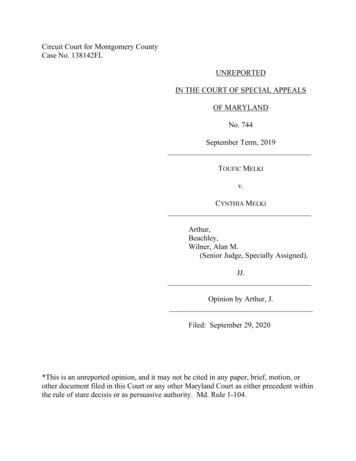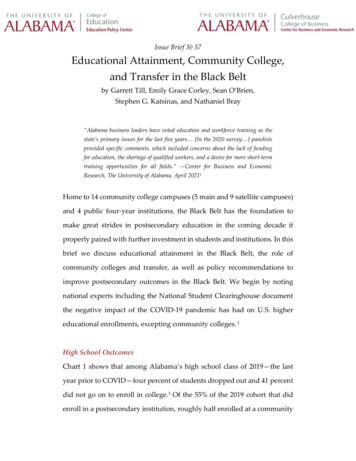
Transcription
Circuit Court for Montgomery CountyCase No. 138142FLUNREPORTEDIN THE COURT OF SPECIAL APPEALSOF MARYLANDNo. 744September Term, 2019TOUFIC MELKIv.CYNTHIA MELKIArthur,Beachley,Wilner, Alan M.(Senior Judge, Specially Assigned),JJ.Opinion by Arthur, J.Filed: September 29, 2020*This is an unreported opinion, and it may not be cited in any paper, brief, motion, orother document filed in this Court or any other Maryland Court as either precedent withinthe rule of stare decisis or as persuasive authority. Md. Rule 1-104.
— Unreported Opinion —On March 26, 2019, the Circuit Court for Montgomery County entered a judgmentgranting Ms. Cynthia Samaha (“Wife”) an absolute divorce from Dr. Toufic Melki(“Husband”) on the grounds of a twelve-month separation. On April 5, 2019, Husbandmoved to alter or amend the judgment, requesting that the court vacate its order grantingan absolute divorce. The court denied the motion.Husband appealed the circuit court’s judgment and its denial of the motion to alteror amend its judgment. We affirm.FACTUAL AND PROCEDURAL HISTORYIn 2009, Husband and Wife were married in Tripoli, Lebanon, at an OrthodoxChristian church. Husband is an Orthodox Christian, and Wife is a Catholic. The couplehad met a year earlier in Beirut, where Wife, a citizen of Lebanon, worked as an operasinger. Husband, a dual citizen of Lebanon and the United States, has resided in theUnited States for over 30 years, but often travels to Lebanon to vacation and visit familymembers.Soon after their marriage, the parties moved to Montgomery County, whereHusband operates a medical practice. Wife began working at Husband’s practice, whileHusband took over the management of Wife’s opera career. The parties have threechildren from their marriage.On August 4, 2016, Wife moved herself and her children out of the couple’s homein Montgomery County. On that same day, Wife filed for a limited divorce in the CircuitCourt for Montgomery County.
— Unreported Opinion —On October 30, 2017, the parties entered into a consent custody order, detailing abi-weekly parenting schedule and awarding Wife primary physical custody and jointlegal custody of the children. On December 17, 2017, the parties entered into a pendentelite support order, which required Husband to pay Wife counsel fees and monthlysupport, provide health insurance for Wife and their children, and continue to pay privateschool tuition for two of the children during the pendency of the litigation. Wifeamended her complaint twice before trial to seek an absolute divorce on the ground of atwelve-month separation. See Md. Code (1984, 2019 Repl. Vol.), § 7-103(a)(4) of theFamily Law Article (“FL”). 1Throughout the litigation, Husband “strenuously object[ed] to the divorce” andregularly demonstrated combative and belligerent behavior toward the court and Wife.He refused to comply with court orders imposing sanctions on him and did notconsistently pay the legal fees awarded to Wife. Husband testified that the divorce “willnot happen as long as [he is] alive,” that he did “not take no for an answer,” and that hewould appeal the divorce “all the way to the Supreme Court.”Wife also included grounds of constructive desertion under FL section 7103(a)(2). The court did not rely upon those grounds in granting the divorce. Wife’ssecond amended complaint included adultery as grounds for divorce, but she withdrewthat ground at trial.12
— Unreported Opinion —The court found that Husband was “not credible” and that he “used his resourcesto disrupt and delay the divorce trial, filing multiple appeals on dubious grounds, failingto cooperate with discovery, and hiring and then firing counsel.” 2On August 29, 2018, Husband moved for summary judgment, arguing that onlyLebanese courts have jurisdiction over the divorce and that the court’s dissolution of themarriage would infringe on his free exercise of religion as an Orthodox Christian.Husband further argued that Maryland’s no-fault divorce statute, FL § 7-103, as appliedto him, violated his constitutional right to marry; that the divorce would infringe on hischildren’s fundamental rights; and that the dissolution of his marriage would impair theobligations under his marriage contract, in violation of the Contracts Clause of the UnitedStates Constitution. 3At the beginning of the trial on October 29, 2018, the circuit court deniedHusband’s motion for summary judgment in an oral ruling.From October 29 to November 1, 2018, the circuit court held a trial on alimony,child support, equitable distribution of marital property, and attorneys’ fees. On March26, 2019, the court entered an opinion and order granting Wife an absolute divorce basedon the parties’ separation of more than twelve months. Among other things, the court’sAt the time when the circuit court handed down its judgment, Husband hadchanged counsel six times. He has engaged yet another lawyer to handle this appeal.2Wife notes that, despite Husband’s stated objection to divorce, he was divorcedtwice before he married her. Husband distinguishes those marriages from his marriage toWife, because only the latter was a religious marriage.33
— Unreported Opinion —order required Husband to pay indefinite alimony in the amount of 9000 per month, amonetary award in the amount of 400,000, child support in the amount of more than 4500 per month, and attorneys’ fees and expert fees in the total amount of 122,000; itrequired Husband to purchase Wife’s interest in two businesses (valued at approximately 169,000); it awarded use and possession of the marital home to Wife for three years(after which she could purchase his interest or have the property sold, at her option); andit obligated Husband to continue to pay the medical and dental expenses for Wife and thechildren.On April 5, 2019, Husband moved to alter or amend the judgment, requesting thatthe court vacate its order granting an absolute divorce. Husband largely reiterated thearguments from his motion for summary judgment in opposition to the divorce order andchallenged the court’s several awards to Wife. The court denied the motion on May 22,2019.Husband noted his timely appeal thereafter.STANDARD OF REVIEW“When an action has been tried without a jury,” as in this case, “the appellate courtwill review the case on both the law and the evidence.” Md. Rule 8-131(c). Appellatecourts review an order that “involves an interpretation and application of Marylandstatutory and case law” to determine “whether the lower court’s conclusions are ‘legallycorrect’ under a de novo standard of review.” Walter v. Gunter, 367 Md. 386, 392(2002). In general, we review the denial of a motion to alter or amend a judgment forabuse of discretion. See, e.g., Halstad v. Halstad, 244 Md. App. 342, 349 (2020).4
— Unreported Opinion —DISCUSSIONHusband appeals the circuit court’s judgment granting Wife an absolute divorceand its denial of the motion to alter or amend the judgment. He presents the followingquestions for our review:1. Whether the Circuit Court lacked the legal authority to grant [Wife] anabsolute divorce based on a one-year separation.2. Whether the Circuit Court abused its discretion in denying [Husband’s]Motion to Alter or Amend the Judgment of Absolute Divorce.Husband presents several arguments contending that the circuit court erred ingranting the divorce and abused its discretion in denying the motion to alter or amend thejudgment. For the reasons discussed herein, we reject each argument and affirm.A. The Circuit Court’s Jurisdiction over the Dissolution of the MarriageHusband argues that the circuit court lacked “subject matter jurisdiction” over thedivorce proceeding because the parties were married in an Orthodox Christian ceremonyin Lebanon and, thus, he says, only Lebanese courts have jurisdiction to dissolve themarriage. According to Husband, Lebanon does not recognize civil marriages, permitsdivorces only in limited circumstances, and does not permit a no-fault divorce. Hecontends that a Maryland court has no power to dissolve a marriage, celebrated inLebanon, between two persons who are now residents of Maryland. 4In support of his contention concerning the limited circumstances under which aperson may obtain a divorce in Lebanon, Husband does not cite any provisions ofLebanese law. Instead, he cites a sworn translation of the Civil Status Law of Procedureof the Greek Orthodox Patriarchate of Antioch and the Rest of the Levant and an expertopinion to the effect that an ecclesiastical court would have “exclusive jurisdiction todissolve an Orthodox marriage in Lebanon.” The expert asserts that the ecclesiastical45
— Unreported Opinion —This argument has no merit. Indeed, Dr. Melki cites no case law or any otherauthority in support of his argument, nor are we aware of any supporting authority.“‘[A]n essential element of the judicial power to grant a divorce, or jurisdiction,’”is that one spouse be domiciled within the state at the time the complaint was filed.Fletcher v. Fletcher, 95 Md. App. 114, 123 (1993) (quoting 24 Am. Jur. 2d, Divorce andSeparation § 238).“A court must have jurisdiction of the res, or the marriage status, in orderthat it may grant a divorce. The res or status follows the domicils of thespouses; and therefore, in order that the res may be found within the stateso that the courts of the state may have jurisdiction of it, one of the spousesmust have a domicil within the state.Id. (quoting 24 Am.Jur.2d, Divorce and Separation, supra, § 238); accord Williams v.North Carolina, 325 U.S. 226, 229 (1945) (stating that, “[u]nder our system of law,judicial power to grant a divorce—jurisdiction, strictly speaking—is founded ondomicil”); Perrin v. Perrin, 408 F.2d 107, 109 (3d Cir. 1969) (stating that “domicile isregarded as the basis for jurisdiction to grant a divorce in the United States”) (citingGranville-Smith v. Granville-Smith, 349 U.S. 1 (1955)).A “domicile” is the place with which a person “has a settled connection for legalpurposes” and the place where the person has a “true, fixed, permanent home, habitationand principal establishment, without any present intention of removing therefrom, and towhich place [the person] has, whenever . . . absent, the intention of returning.” Dorf v.Skolnik, 280 Md. 101, 116 (1977). A party’s “domicile, generally, is that place wherecourt would apply canon law (i.e. religious law) to determine whether a party was entitledto a divorce.6
— Unreported Opinion —[the party] intends to be.” Oglesby v. Williams, 372 Md. 360, 373 (2002) (quotingRoberts v. Lakin, 340 Md. 147, 153 (1995)). Intent “is best shown by objective factors,”most importantly “where a person actually lives.” Fletcher v. Fletcher, 95 Md. App. at124 (citations omitted).“The question, then, as to subject matter jurisdiction, is whether, applying thesestandards and factors,” Husband or Wife “is a Maryland resident.” Fletcher v. Fletcher,95 Md. App. at 125. The record demonstrates that both Husband and Wife have lived inMontgomery County since August 2009 and that Husband has operated a medicalpractice in the area since 1992. Husband continues to reside at the parties’ marital home,and Wife has lived in an apartment in Montgomery County since moving out of the homein 2016. Husband testified at trial that he planned to open a surgical center in NorthPotomac, Maryland, in Montgomery County, and that he has formed an LLC andpurchased a property for the business. “To conclude, on this record,” that Husband orWife are not domiciled in Maryland would “not only [be] error, but clear, patent, obviouserror.” Id. The circuit court, therefore, had subject-matter jurisdiction over the divorce. 5Husband’s argument is better understood not as a contention that a Marylandcourt lacks the power to determine whether one Maryland domiciliary must remainmarried to another person against her will, but as a contention that Maryland shouldapply (what he claims to be) Lebanese law in determining the grounds for a divorce.Even when understood in that light, however, Husband’s contention is incorrect. SeeRestatement (Second) of Conflicts of Laws § 285 (1971) (stating that “[t]he law of thedomiciliary state in which the action is brought will be applied to determine the right todivorce”). For example, some states (such as Louisiana) permit couples to enter into“covenant marriages,” in which they agree to forgo no-fault grounds for a divorce. Yet,if one or both of those spouses should become a domiciliary of a state that permits nofault divorces, that state will apply its own substantive law and will permit a no-faultdivorce. Blackburn v. Blackburn, 180 So.3d 16, 19 (Ala. Civ. App. 2015). Where57
— Unreported Opinion —B. Impairment of the Marriage ContractHusband contends that the grant of an absolute divorce on “no-fault” groundsimpaired the obligations of the parties’ marriage contract, in violation of the ContractsClause of Article I, Section 10, of the United States Constitution. Husband claims thatthe parties’ marriage contract does not permit no-fault divorces and that the courtimpermissibly expanded the terms of the parties’ marriage contract by granting thedivorce on the grounds of twelve-month separation. 6Husband’s contention ignores a well-established legal principle and deserves scantdiscussion. Although marriage is a civil contract for some purposes (see Section C,below), the Supreme Court has said that “marriage is not a contract within the meaning ofthe [Contracts Clause’s] prohibition” and that the clause “never has been understood torestrict the general right of the legislature to legislate on the subject of divorces.”Maynard v. Hill, 125 U.S. 190, 210 (1888). Courts have regularly held that marriage isnot a contract that is constitutionally protected from interference, and thus that it may bemodified by laws respecting divorces. See In re Marriage of Walton, 28 Cal. App. 3dneither party is a domiciliary of the state where the marriage was celebrated, that state isno longer “interested” in the couple’s status. Id.Husband does not contend that the parties entered into a written contract to forgoa no-fault divorce. To the contrary, he appears to rely on some kind of implied or oralpromise, perhaps incidental to the religious marriage itself, to the effect that neitherspouse would pursue a divorce except on grounds permitted by the Orthodox Church.Because we shall conclude that the Contracts Clause does not apply to marriagecontracts, we need not consider Wife’s contention that the alleged contract is too vague tobe enforced and that the parol evidence rule would bar the enforcement of the allegedcontract.68
— Unreported Opinion —108, 112 (1972); In re Marriage of Franks, 542 P.2d 845, 850 (Colo. 1975); McCree v.McCree, 464 A.2d 922, 931 (D.C. 1983); In re Marriage of Semmler, 481 N.E.2d 716,7181 (Ill. 1985); Richter v. Richter, 625 N.W.2d 490, 494-95 (Minn. Ct. App. 2001);Gleason v. Gleason, 26 N.Y.2d 28, 42 (1970). We shall follow the conclusions of thesecourts and decline to vacate the divorce under the Contracts Clause.C. Freedom of Religion and No-Fault DivorceHusband again invokes the United States Constitution to argue that the grant of thedivorce infringed on his First Amendment right to free exercise of religion. Because theOrthodox faith does not permit divorces absent fault, Husband claims that the dissolutionof the marriage on the grounds of a twelve-month separation would unconstitutionallyforce him to commit a mortal sin according to his religion.The First Amendment provides that “Congress shall make no law respecting anestablishment of religion, or prohibiting the free exercise thereof.” U.S. CONST. AMEND.I. This right, however, “does not relieve an individual of the obligation to comply with a‘valid and neutral law of general applicability on the ground that the law proscribes (orprescribes) conduct that his religion prescribes (or proscribes).’” Employment Div., Dep’tof Human Res. of Oregon v. Smith, 494 U.S. 872, 879 (1990).“[A] law that is neutral and of general applicability need not be justified by acompelling governmental interest even if the law has the incidental effect of burdening aparticular religious practice.” Church of the Lukumi Babalu Aye v. City of Hialeah, 508U.S. 520, 531 (1993). The Free Exercise Clause of the First Amendment ordinarily does“not grant to an individual or a religious organization ‘a constitutional right to ignore9
— Unreported Opinion —neutral laws of general applicability’ even when such laws have an incidental effect ofburdening a particular religious activity.” Montrose Christian Sch. Corp. v. Walsh, 363Md. 565, 585 (2001) (quoting City of Boerne v. Flores, 521 U.S. 507, 513 (1997)).Conversely, laws that “target[] particular religious practices, or selectively impos[e]burdens on conduct motivated by religious belief are subject to strict scrutiny and ‘mustbe justified by a compelling governmental interest and must be narrowly tailored toadvance that interest.’” Id. at 586 (quoting Church of the Lukumi Babalu Aye v. City ofHialeah, 508 U.S. at 531-32).The Supreme Court has long held that legislatures may enact general laws thatregulate marriage, even if the application of the law interferes with some religiouspractices. See Reynolds v. United States, 98 U.S. 145, 164-67 (1878) (upholding federalcriminal law prohibiting polygamy, because Congress was “free to reach actions whichwere in violation of social duties or subversive of good order”). Marriage, which theSupreme Court acknowledges is a “sacred obligation, is nevertheless, . . . a civilcontract.” Id. at 165. Because a trial court granting a divorce merely dissolves a civilcontract between the spouses, courts universally hold that no-fault divorce statutes do notinfringe on the right to the free exercise of religion, even if a spouse’s religious beliefsprohibit no-fault divorces. See Williams v. Williams, 543 P.2d 1401, 1403 (Okla. 1975),cert. denied, 426 U.S. 901 (1976); accord Grimm v. Grimm, 844 A.2d 855, 859 (Conn.App. Ct. 2004), aff’d in part, rev’d in part on other grounds, 886 A.2d 391 (Conn. 2005);Sharma v. Sharma, 667 P.2d 395, 396 (Kan. Ct. App. 1983); Martian v. Martian, 328N.W.2d 844, 846 (N.D. 1983); Pankoe v. Pankoe, 222 A.3d 443, 449-50 (Pa. Super. Ct.10
— Unreported Opinion —2019) (citing Wikoski v. Wikoski, 513 A.2d 986 (Pa. Super. 1986)); Waite v. Waite, 150S.W.3d 797, 801-02 (Tex. App. 2004).Section 7-103(a)(4) of the Family Law Article, which permits divorces based on atwelve-month separation of the spouses, is a neutral law of generally applicability. Thestatute does not infringe Husband’s religious rights merely because it allows Wife, whodoes not share his beliefs, to obtain a divorce. Husband “still has [his] constitutionalprerogative to believe that in the eyes of God, [he] and [his] estranged [wife] areecclesiastically wedded as one, and may continue to exercise that freedom of religionaccording to [his] belief and conscience.” Williams v. Williams, 543 P.2d at 1403; accordSharma v. Sharma, 667 P.2d at 396. In fact, it might well violate the EstablishmentClause of the First Amendment to compel Wife to remain married to Husband because ofHusband’s religious beliefs, for the court would then be preferring one spouse’s beliefsover the other spouse’s. See Sharma v. Sharma, 667 P.2d at 396.We therefore discern no infringement on Husband’s First Amendment rightsthrough the circuit court’s dissolution of the marriage on the grounds of twelve-monthseparation.D. The Doctrine of ComityThe common-law doctrine of comity provides that the courts of one state orjurisdiction may give effect to the laws and judicial decisions of another state orjurisdiction as a matter of deference or respect. See, e.g., Washington Suburban SanitaryComm’n v. CAE-Link Corp., 330 Md. 115, 140 (1993). Husband argues that theprinciples of comity require this Court to vacate the judgment of absolute divorce11
— Unreported Opinion —because Lebanese law, rather than Maryland law, should apply to the parties’ marriage.Husband seemingly argues that Maryland courts cannot grant a divorce on no-faultgrounds because Lebanese law does not permit such divorces. Husband’s argument isdirectly contrary to prevailing principles regarding conflicts of law: “The local law of theforum determines the right to a divorce . . . because of the peculiar interest which a statehas in the marriage status of its domiciliaries.” Restatement (Second) of Conflict ofLaws, supra, § 285, cmt. a.In any event, the doctrine of comity applies in two different scenarios, neither ofwhich pertains here. In the first, comity refers to “the recognition and enforcement byone jurisdiction of the fully and finally litigated judgments of another jurisdiction.”Apenyo v. Apenyo, 202 Md. App. 401, 410 (2011); see also Aleem v. Aleem, 404 Md.404, 413 (2008) (concerning whether a divorce action already pending in Marylandshould be dismissed because of an intervening decree of divorce obtained in Pakistan).In the second, comity, as a matter of “jurisdictional courtesy,” concerns whether “thecourt of one state may stay or dismiss a proceeding pending before it on the ground that acase involving the same subject matter and the same parties is pending in a court ofanother state or foreign country.” Apenyo v. Apenyo, 202 Md. App. at 410 (concerningwhether a pending divorce action in Ghana took precedence over a later filed divorceaction in Maryland). A court’s decision whether to defer to a foreign jurisdiction iswithin its sound discretion. Id. at 413.Neither of these scenarios relate to this matter. A Lebanese court has not entered ajudgment dissolving the parties’ marriage, nor have Husband or Wife filed a divorce12
— Unreported Opinion —action in Lebanon that is currently pending. The action filed by Wife in the Circuit Courtfor Montgomery County is the only proceeding concerning the parties’ marriage,meaning that the circuit court had no other judgment or proceeding to which to defer.We therefore will not vacate the circuit court’s judgment under the doctrine of comity.E. Motion to Alter or Amend JudgmentHusband filed a post-judgment motion in which he asked the circuit court to alteror amend its conclusions concerning its power to grant a divorce. The motion largelyreiterated the arguments that the court had previously considered and rejected. The courtdenied the motion.“‘In general, the denial of a motion to alter or amend a judgment is reviewed byappellate courts for abuse of discretion.’” Schlotzhauer v. Morton, 224 Md. App. 72, 84(2015) (quoting RRC Northeast, LLC v. BAA Maryland, Inc., 413 Md. 638, 673 (2010)),aff’d, 449 Md. 217 (2016). When a party requests that a court reconsider a ruling on thebasis of arguments that the party raised or could have raised before the court made itsruling, the court has almost limitless discretion to deny the motion. Steinhoff v.Sommerfelt, 144 Md. App. 463, 484 (2002). In this case, the circuit court did not abuseits discretion in denying a motion to alter or amend that largely reiterated the argumentsthat the court already rejected.JUDGMENT OF THE CIRCUIT COURTFOR MONTGOMERY COUNTYAFFIRMED; COSTS TO BE PAID BYAPPELLANT.13
The correction notice(s) for this opinion(s) can be found 4s19cn.pdf
Christian church. Husband is an Orthodox Christian, and Wife is a Catholic. The couple had met a year earlier in Beirut, where Wife, a citizen of Lebanon, worked as an opera singer. Husband, a dual citizen of Lebanon and the United States, has resided in the United States for over 30 years, but often travels to Lebanon to vacation and visit family











